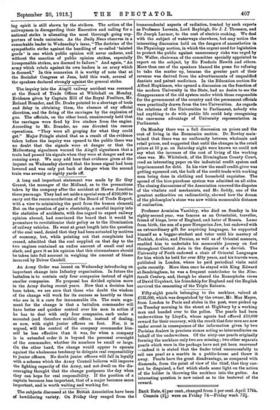An Army Order was issued on Wednesday introducing an important
change into Infantry organization. In future the battalion is to contain only four companies instead of eight smaller companies. No proposal has divided opinion more in the Army during recent years. Now that a decision has been taken, we are sure that those who doubt the wisdom of the change will work for its success as heartily as those who see in it a cure for innumerable ills. The main argu- ment for the change is that a battalion commander will have better and quicker control over his men in action if be has to deal with only four companies, each under a mounted (and therefore mobile) officer, instead of dealing, as now, with eight junior officers on foot. Nor, it is argued, will the control of the company commander him- self be less effective tkan it was, for when a company is in extended order it is beyond the personal oversight of the commander, whether its numbers be small or large. On the other band, the change would appear to operate against the wholesome tendency to delegate real responsibility to junior officers. No doubt junior officers will fall in loyally with a scheme which the Army Council believes will improve the fighting capacity of the Army, and not dwell on the dis- couraging thought that the change postpones the day when they can hope for real responsibility. If the position of a captain becomes less important, that of a major becomes more important, and is worth waiting and working for.










































 Previous page
Previous page